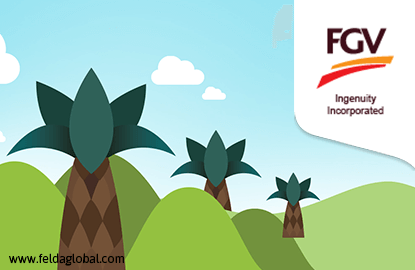
This article first appeared in The Edge Malaysia Weekly, on December 21 - 27, 2015.
WHEN Felda Global Ventures Holdings Bhd (FGV) made its high-profile debut on Bursa Malaysia in mid-2012, it put together a neat RM4.5 billion cash pile with which it would expand its landbank. While it has been aggressive on the acquisition trail, the results have yet to show on the bottom line.
These purchases were seen as crucial given the group’s legacy of inefficiency and old oil palms that were in dire need of refreshment, and acquisitions were the quickest fix.
While rolling out a 15,000ha per year replanting scheme and looking inward to address low productivity and efficiency has been the obvious long-term solution, it is also a slow process that will take time to show results.
Since its initial public offering, FGV has bought close to 70,000ha of plantation land in Malaysia and Indonesia and lowered the average age of its oil palm trees to 15.6 years. This includes 64,000ha replanted since listing. Three years ago, over 50% of its oil palms were over 18 years old.
The agribusiness giant is targeting an average age of 11.8 years in 2020, but just last month, FGV revealed that is it scaling back its replanting target to 10,000ha a year.
Analysts chalk this up to tightness on the cash front, not to mention the threat of an El Niño, which is not an ideal environment for new palms.
This year, the group spent RM655 million to buy 8,478ha of brownfield land in Beluran, Sabah, from Practice Note 17 company Golden Land Bhd.
In fact, after last year’s acquisition of London AIM-listed Asian Plantations Ltd for RM568 million, FGV has almost exhausted its net IPO proceeds. To date, its post-IPO acquisitions have cost a massive RM4.94 billion.
In contrast, the group had total borrowings of RM3.03 billion and cash and cash equivalents of RM2.1 billion as at end-September 2015, giving it a net debt position of RM934.36 million.
While investors have seen the outflows, any sight of corresponding returns are not yet visible.
Granted, the plantation sector has suffered a double whammy this year, with languishing crude palm oil prices and ever-worsening dry weather. But what is plaguing FGV seems to be its costs, not simply its top line, as would have been expected.
In fact, 2015 has seen the worst margin compression yet. For its nine months ended Sept 30 (9MFY2015), the group’s net profit margin came to just 0.14%.
Since listing, FGV’s net profit margin actually made an uptick in FY2013, coming in at 7.82% compared with 6.25% in FY2012. But in FY2014, the net margin compressed to as low as 1.99% as the group felt the effects of the demise of the commodity boom.
For 9MFY2014, net profit shrank to RM15.74 million from RM286.16 million while revenue remained flat at RM11.4 billion.
Net losses in the third quarter (3QFY2015) ate into its already thinning profit for the cumulative quarters as 3QFY2015 net loss tripled to RM33.92 million from RM9.33 million a year ago.
This is despite posting higher revenue of RM4.51 billion, up 13.8% from RM3.96 billion in 3QFY2014. The bulk of its worsening earnings were attributed to lower contribution from its palm plantation and trading, marketing and logistics segment, which posted a loss.
But the real shocker has been FGV’s ballooning administrative expenses. Administrative expenses for the quarter alone almost doubled to RM286 million, bringing the full year figure to RM708.7 million, up over 33% year on year.
This seems to be the largest cost component in FGV’s books, and at 9MFY2015, was close to FY2014’s full-year figure of RM839.8 million. In FY2014, administrative expenses grew more than three-fold from just RM193.2 million in FY2013.

FGV has not provided details as to what exactly these expenses are — nor did it respond to questions posed by The Edge — but analysts say the rising costs are due to the consolidation of its new acquisitions.
They refer to items like staff costs that are of a recurring nature and not likely to reduce in future. On the flipside, FGV should be looking at how to make its assets work harder for the bottom line.
In the meantime, investors are keeping an eye out for developments on the controversial PT Eagle High Plantations Tbk deal.
Most recently, discussions ground to a halt as both parties were unable to agree on the purchase price in light of the weak crude palm oil price and ringgit environment. The parties are said to be looking for alternative forms of investment.
The deal initially involved FGV spending US$698 million, or about RM3 billion today, for a 37% stake in the company, which would grant it access to about 425,000ha of land in Indonesia.
Some quarters are not looking forward to the deal going through, as analysts have said the acquisition could be earnings dilutive and even value-destroying.
It does not help that FGV will have to gear up to fund the purchase that will not even give it a controlling interest.
What investors want to see now, more than three years on from the IPO, are the returns on their heavy investment in FGV.
Save by subscribing to us for your print and/or digital copy.
P/S: The Edge is also available on Apple's AppStore and Androids' Google Play.